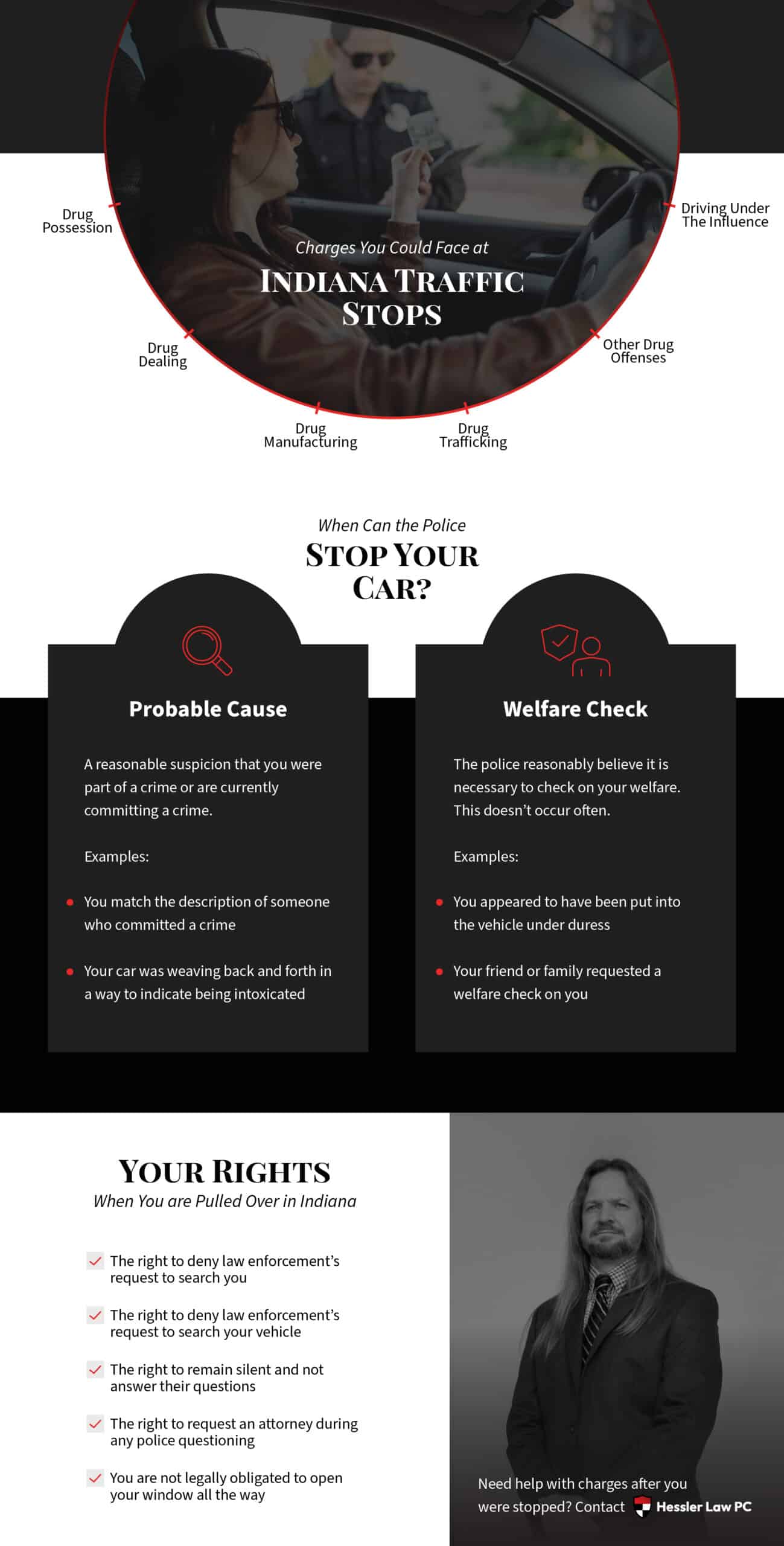Home | The Rules for Indiana Traffic Stops

The police have specific rules and regulations they must follow in addition to the law when they are conducting traffic stops. Unfortunately, many drivers are unaware of their rights. This leads to police taking advantage of drivers through illegal searches, unreasonable stops, and unlawful arrests.
If you were pulled over and arrested, and you believe the traffic stop was improper, you need to take action to defend yourself. The consequences of a conviction may be far more severe than you previously thought. An experienced Indiana criminal lawyer in Indianapolis, IN can help you clear your name and avoid these harsh penalties.

You Could Face Many Charges After a Traffic Stop
There are many criminal charges you might face after being stopped for a routine traffic violation in the state of Indiana.
You could face severe criminal penalties associated with misdemeanor and felony crimes such as:
- Drug possession
- Drug dealing
- Drug manufacturing
- Drug trafficking
- Other drug offenses
- Driving under the influence of drugs or alcohol
Avoid Self Incrimination Through Police Questioning
When you are pulled over for a traffic violation, police have the right to ask you questions about the violation in question. They may even ask you about the trip you were on while currently driving your vehicle.
If your answers to their questions give any indication that another type of crime was taking place, you can bet that they will attempt to charge you. It’s best to politely refuse to answer these questions until you have a lawyer present.
When the Police Can Stop Your Vehicle
There are many misconceptions surrounding when police have the right to stop and search your vehicle or person. There are two primary instances where law enforcement can stop your vehicle:
- They have probable cause
- They need to do a welfare check
What is Probable Cause?
The police must have a valid reason to stop your vehicle. One legally acceptable reason to stop your car is that they have reasonable suspicion that you were part of a crime or are currently committing a crime.
Reasonable suspicion of your participation in a crime must be based on facts. For instance, your appearance and clothing may fit the description of a person wanted for a crime. Or, if you were weaving between lanes without using a blinker, the officer may reasonably believe this is due to driving while intoxicated.
Welfare Checks
A vehicle may be pulled over because the police reasonably believe it is necessary to check on your welfare. This doesn’t occur often; however, police officers may see or hear something that causes them to think you need help.
For example, the police may overhear a heated conversation in which you are ordered into the vehicle under apparent duress. They may stop the car to ensure you are safe. Your friends or family can also request a welfare check. In this situation, the police may have been given your name, description, and vehicle information to find and check on you.
When the Police Can Enter Your Vehicle
The police do not always have a right to enter your vehicle, and you are not required to consent to a vehicle search.
The Police Have Probable Cause
For the police to enter your vehicle without your permission, they must have probable cause or a warrant. The police have probable cause if they see an illegal item within the vehicle, such as drugs, or if you admit to a crime. A minor traffic violation like speeding is not probable cause to search your car.
You Gave the Police Permission
The police can also gain the right to enter and search your vehicle by requesting your permission. However, if the police ask to search your car, they do not have probable cause to do so.
When Can the Police Charge You With a Crime After a Traffic Stop?
The police must always have a lawful reason to stop your vehicle. Either the police have reasonable suspicion of a crime, or they believe you require emergency assistance. If you are stopped for any other reason, the stop is likely unconstitutional.
An unconstitutional stop does not become lawful because the police find evidence of criminal activity. The Indiana Supreme Court recently affirmed this.
Mary Osborne v. the State of Indiana
In the case of Mary Osborne v. the State of Indiana, the Indiana Supreme Court found a police officer stopped Osborne’s vehicle in concern for her well-being. After stopping Osborne’s car, the officer saw she was safe and uninjured but noticed signs of intoxication and arrested her for drunk driving.
The court found the facts of the situation did not support the officer’s concern or his stopping Osborne’s vehicle. There were no outward signs that Osborne was injured and in need of emergency assistance. She did not violate any traffic laws, so the officer did not have reasonable suspicion before the stop to believe Osborne was intoxicated.
Therefore, when the officer stopped her, he did so unreasonably. The court determined this was an improper intrusion upon Osborne’s constitutional rights against unreasonable searches and seizures. The evidence of her driving while intoxicated was suppressed.
Eduardo Cruz-Salazar v. the State of Indiana
In the case of Eduardo Cruz-Salazar v. the State of Indiana, the Indiana Supreme Court upheld the police officer’s entrance into Cruz-Salazar’s vehicle and his arrest for possession of cocaine. In this case, the police received a call about a car parked in front of a residence for 30 minutes.
When the officer approached the vehicle, he found Cruz-Salazar either sleeping or unconscious behind the wheel. When Cruz-Salazar did not respond to taps on his window, the officer opened the car door to check on him. Cruz-Salazar eventually woke up and admitted to the officer he had been drinking.
After being placed under arrest for a DUI in Indiana, the officer conducted a pat-down and found the cocaine. Cruz-Salazar claimed the police unreasonably entered his vehicle without a warrant or probable cause.
However, the court found the police officer had reasonable belief that there could be a medical emergency and upheld the arrest. The result of these two Indiana Supreme Court cases is that an arrest must come from a valid traffic stop.
What to Do if You’re Pulled Over in Indiana
People find themselves facing severe charges unrelated to their traffic stops because they are unaware of what to do or what their rights are. Here’s how to react when you are stopped for a traffic violation in Indiana and what your rights are when you are stopped.
Handling the Complaint Against You
If you hope to avoid criminal charges following your traffic stop, you must handle the traffic stop as correctly and safely as possible. Here are the steps you should take if you are pulled over for a traffic stop in Indiana:
- As soon as you see police lights flashing, pull over
- Do not get out of your vehicle
- Keep your hands where police can see them
- Only give police your license and registration after they ask you to
- If the police ask you to exit the car, you must do so
- Do not argue with police about your stop or anything else — your attorney can handle claims of improper stops or police misconduct in court
Understanding Your Rights
You must understand your rights when you are stopped. Understanding your rights can help you avoid criminal charges people face after traffic stops.
Here are some of your fundamental rights when you are pulled over in Indiana:
- The right to deny law enforcement’s request to search you
- The right to deny law enforcement’s request to search your vehicle
- The right to remain silent and not answer their questions
- The right to request an attorney during any police questioning
- You are not legally obligated to open your window all the way
Contact Hessler Law Today
Unconstitutional traffic stops should never result in a criminal conviction. If you believe the police unreasonably stopped you before you were arrested, call an experienced Indianapolis criminal defense attorney at Hessler Law PC to schedule your initial consultation.
To get started on your defense strategy, complete our online contact form or call our office at (317) 430-1002.
